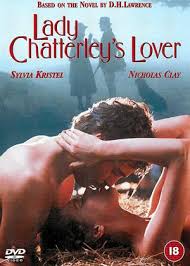
LADY CHATTERLEY'S LOVER
UK/France, 1981, 99 minutes, Colour.
Silvia Kristel, Nicholas Clay, Shane Briant, Elizabeth Spriggs.
Directed by Just Jaeckin.
Lady Chatterley's Lover, despite its credentials, is a much more restrained version of D. H. Lawrence's novel than expected. Filmed in the '50s in France with Danielle Darrieux and Leo Genn, the film has been the basis for soft-core pornography films. Director Just Jaeckin was responsible for making Emmanuelle with his star Sylvia Kristel. He also made The Story of O. However, filming in English, his production veers more towards B.B.C. style adaptation of novels. There is excellent re-creation of atmosphere in decor and costume. The scenes are more restrained than in Lawrence's novel, as is the language.
Sylvia Kristel does her best with the role of Connie Chatterley and is dubbed with an elegant English voice. Nicholas Clay (Excalibur, Evil Under the Sun, Tristan and Isolte) has a gentlemanly rough readiness as the gamekeeper. Shane Briant is a very good Sir Clifford and Anne Mitchell and Elizabeth Spriggs are excellent as Mrs. Bolton and Lady Eva. The film could be compared with other versions of Lawrence's novels: Ken Russell's Women in Love, Christopher Miles' The Virgin and the Gypsy. It is not as substantial as these. There is some background to the writing and publication of Lady Chatterley’s lover in Christopher Miles' biographical film Priest of Love. While there is an emphasis on sexual frankness, the film highlights Lawrence's social themes and the separation
of classes.
In the Monthly Film Bulletin synopsis from Britain (December 1981) there is a description of a prologue about the eve of the First World War which is not in current prints.
1. The significance of D. H. Lawrence's novel? The controversy in its writing and publication? Law courts and obscenity tests? The reflection of changes in standards and tastes? The acceptance of cause celebre books of earlier decades? The novel in Lawrence's career? Themes, preoccupations? Passion, sexuality and frankness of expression? Social questions and class distinctions?
2. An appropriate adaptation of Lawrence's novel? The career of the director as fashion photographer and soft-core pornography director? The career of Sylvia Kristel? Audience expectations from Emmanuelle? Better than the expectations? The fashion gloss style of the film? The treatment of the sexuality scenes - with echoes of soft-core films? The ability of the director to create atmosphere? The strength of the actress in the role? The adaptation of the novel, the strong British supporting cast? Locations, re-creation of period? Realism and artificiality? Discreet communication of the issues? Fidelity to the text and spirit of Lawrence?
3. Colour photography, period, locations, Sir Clifford's estate, the countryside, the mines? The comparison with Biarritz and French society? The beginning of the modern era? The musical score and its lush style?
4. The stars and their suitability? Ability? Dubbing? Making the plot credible?
5. The basic plot and its simplicity? Real situations? Authentic characterisations? British traditional values? The critique of the formalities of marriage? The realities of love? Controversy and critique in the film?
6. The portrait of Lady Chatterley? In herself, her marriage to Sir Clifford, the accident and the breakdown of marriage relationships? Her decision for fidelity, love? The indication of lack of sexual fulfilment? The quiet detail? Sir Clifford and his moods? His wanting to cope by himself? Boredom? Physical contact? Connie and her attention to Clifford, devotion? Her needs and dreams - the symbolic dream about the horse? Her discussions with Lady Eva? Her being urged not to sacrifice herself? Lady Eva and her worldly-wise advice? Clifford and his giving her permission to take a lover? Their pushing Connie into the situation?
7. The characterisation of Mellors? His disregarding authority, his being his own man? Giving messages? Connie's seeing him washing? Curiosity, passion? Her bringing the message to him? Following him? Her accepting Sir Clifford's permission for the liaison? Yet her fear? The clashes between them? The expression of class distinction? The meetings and the tension? The passionate scenes together? The night together, the rain? The pressure of Sir Clifford? Her being discovered? Sir Clifford's reaction?
8. Mellors and his roughness, his work, service? Attitude towards life? Marriage background? A physical man, man of passion? The talking and sharing with Connie? The love breaking through the barriers?
9. The personality of Sir Clifford? The estate, his position? Aristocracy? His accident? Activities: reading and non-physical occupations? Self management? The lack of physical intimacy? His pushing Connie? Yet his reaction to her affair with Mellors? Searching the house? The empty bed? His self-control but anger? His discussions with Connie and sending her away?
10. The effect of the experience in France? Her missing Mellors before she went? Her being bored with her sister? The artificiality of Biarritz? The gigolos and sexual liaisons? Her tearing up Sir Clifford's letters? Her return and mistaking the new gamekeeper for Mellors? The choices and her decision to leave?
11. Her searching out Mellors at the mine? The breaking through the social barriers? The decision to go to Canada?
12. The sketch of Lady Eva and the British aristocracy, her concern for her son, her concern for Connie? The nature of her advice?
13. The enigmatic characterisation of the nurse? Her presence in the village? Her attitude towards marriage? The pressure on Connie? Her helping Sir Clifford? Her staying in the household? Her helping Connie, turning a blind eye? Her giving messages to Mellors?
14. The film signalling the passing of an era and the emerging of a new age? Moral standards? Egalitarianism?
15. The film as an enjoyable romantic melodrama? As a version of D. H. Lawrence's work and ideas?